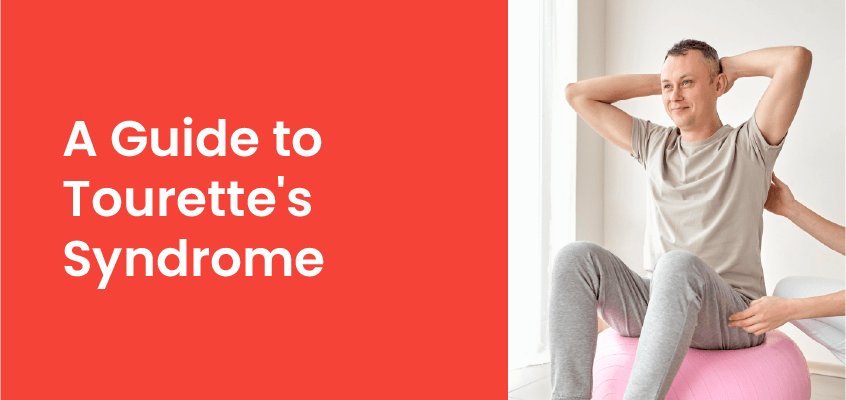Tourette’s syndrome is a neurological disorder characterized by involuntary repetitive movements or sounds known as tics. A person with Tourette’s disorder may blink their eyes repeatedly, shrug their shoulders, or blurt out offensive words or sounds. Issues with the metabolism of neurotransmitters in the brain are responsible for this condition.
In most cases, the symptoms of Tourette’s syndrome manifest before a child reaches the age of 18. Attention-deficit hyperactivity disorder (A.D.H.D.), obsessive-compulsive disorder (O.C.D.), depression, and anxiety often accompany the condition.
What is Tourette’s disorder?
Tourette’s syndrome is a neurological condition characterized by involuntary, rapid, and repetitive movements or sounds known as tics. It is part of a group of disorders associated with the developing nervous system called tic disorders. Tourette’s syndrome often varies in type, severity, and frequency. Tourette’s disorder may be simple or complex and motor or vocal.
Many people with Tourette’s syndrome do not need treatment if their symptoms do not bother them excessively or interfere with their day-to-day lives. The condition is not degenerative, and people with Tourette’s disorder can lead an everyday life.
Symptoms of Tourette’s disorder
To be diagnosed with Tourette’s syndrome, a person must meet specific criteria.
- Simple motor tics involve the involuntary movement of a single or group of muscles. Symptoms include nose sniffing, blinking, neck twitching, coughing, and eye-rolling.
- Complex motor tics: These involve the involuntary movement of multiple muscle groups. Symptoms include touching oneself, shaking, jumping, hitting, or performing a task.
- Simple phonic tics: These are simple sounds or vocalizations such as coughing, grunting, swallowing, throat clearing, sucking or blowing.
- Complex phonic tics: These include the vocalization of difficult words and phrases. These verbalizations can often be socially inappropriate.
Causes of Tourette’s disorder
The exact cause of the disorder is unknown, but some possible reasons include:
- Environmental Factors: Exposure to environmental toxins, such as maternal smoking or prenatal life stressors, during the prenatal or post-natal stages can lead to the development of Tourette’s disorder.
- Biological Factors: The abnormal metabolism of the brain chemical dopamine may be responsible for triggering Tourette’s Syndrome.
- Psychological Factors: Your emotional state, such as frustration or anxiety, can also play a significant role in Tourette’s exacerbation.
Treatment of Tourette’s disorder
Mild cases of Tourette’s syndrome do not require treatment. However, various treatment options are available in cases of severe tics, suicidal tendencies, and aggressiveness.
Therapy
A person with Tourette’s syndrome should undergo psychotherapy or behavioural therapy.
- Behavioural Therapy: This therapy teaches people with T.S. how to manage their tics. Though it is not a cure, it can help reduce tics’ occurrence, severity, and impact.
- Psychotherapy: Comprehensive Behavioral Intervention for Tics, also known as C.B.I.T., is one of the most effective therapies for Tourette’s Disorder. Furthermore, therapists recommend treatments such as relaxation techniques, deep breathing exercises, guided meditation, and hypnosis to alleviate the symptoms of Tourette’s syndrome.
Medication
There are currently no medications available to treat Tourette’s disorder. However, doctors may prescribe certain medications to manage the symptoms. These include:
- Risperidone (Risperdal), Aripiprazole (Abilify), Haloperidol (Haldol), or other neuroleptic drugs: These drugs block the dopamine receptors in the brain to help manage the tics.
- onabotulinum toxin A (Botox): Doctors sometimes recommend Botox injections to help manage simple vocal and motor tics.
- Methylphenidate (Ritalin): This stimulant can help reduce the symptoms of A.D.H.D. without affecting the tics.
- Clonidine: This blood pressure medication can help manage tics, support impulse control, and minimize rage attacks.
Neurological treatment
- Deep brain stimulation: People with severe tics benefit from this treatment. The healthcare professional will implant a battery-operated device in the brain and use it to stimulate parts of the brain that control movement.
Resources for those with Tourette’s disorder
Living with Tourette’s disorder can lead to feelings of isolation and loneliness. Their inability to manage the tics and outbursts can cause them to feel reluctant to take part in social activities. The important thing that people with the disorder need to understand is that support is available to help them manage their condition effectively.
A person with Tourette’s syndrome can talk to their therapist or healthcare professional about any support groups available in their area. Group therapy is also a good option for managing Tourette’s disorder. Meeting people going through the same condition and developing a bond with them can help a person with Tourette’s deal with their feelings of isolation and loneliness.
If you or someone in your family is living with Tourette’s disorder, it would be a good idea to join a family support group to get more information about the condition. The more information you gather, the better you can help yourself or your loved ones.
Conclusion
Tourette’s disorder is a condition that does not have a cure, but therapies and medication help alleviate the problem. Each person copes differently with Tourette’s syndrome and the physical, social, and emotional challenges that accompany the disorder. But it is important to remember that a person with Tourette’s can effectively manage their symptoms and enjoy an everyday life just like their peers and friends.
If you or someone in your family is living with Tourette’s disorder and want to seek professional help, visit United We Care, an online mental health platform that connects you with psychologists and life coaches trained in handling Tourette’s syndrome. Talk to a therapist today!










